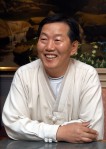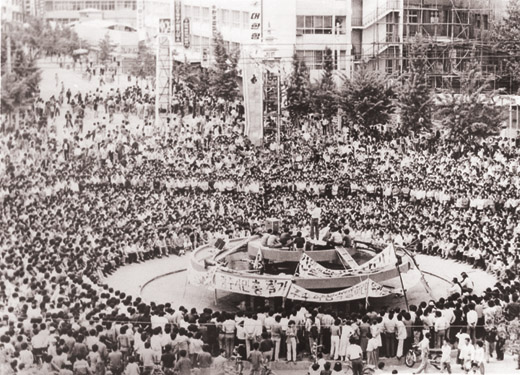Translated by Chae-Pyong Song and Melanie Steyn
Oh, Gwangju! The Cross of Our Nation! by Kim Jun-tae
Oh, Gwangju! Mudeung Mountain!
Our city of eternal youth
that sheds blood tears
between deaths!
Where has our father gone?
Where has our mother collapsed?
Where has our Son died and been buried?
And, where does our Daughter lie dead, her mouth gaping?
Where have our soul and spirit
gone, torn and broken into pieces?
Gwangju, which both God and birds have left!
Our blood-covered city
where decent people
are still alive, morning and evening,
collapsing, falling down, and rising again!
Ah, the phoenix, the phoenix, the phoenix
of the South Province full of wailing
that has tried to drive away death with death,
and to seek life with death!
When the sun and the moon nosedive
and all the mountain ridges
stand shamelessly high,
ah, the flag of liberty
that nobody can tear down
or take away!
The flag of humanity!
The flag, hardened with flesh and bones!
Oh, our city
where at times our songs, dreams, and love
roll like waves,
and at other times we are hidden in graves.
Oh, Gwangju, Gwangju
who carries the cross of this nation,
climbing over Mudeung Mountain,
and walks over the hill of Golgotha!
Oh, the son of God,
whose whole body is covered with wounds,
and who is the emblem of death!
Are we really quite dead?
Dead,
unable to love this country any more,
unable to love our children any more?
Are we absolutely dead?
On Chungjangro, on Kumnamro,
At Hwajungdong, at Sansoodong, at Yongbongdong
At Jisandong, at Yangdong, at Kyerimdong,
And, and, and . . . .
Ah, the wind that blows over,
gobbling up our blood and flesh!
The hopeless flow of time!
Should we now
just collapse, fall, and cry?
Terrified of life, how should we
breathe a breath?
Oh, all those survive
lower their heads like sinners.
All those still alive have lost
spirit, and they find it difficult
even to face their rice bowls.
Afraid, they don’t know what to do.
(Dear, I was killed
while I was waiting for you,
waiting for you outside the door.
Why did they take away my life?
Though we lived in a rented room,
we were quite happy.
I wanted to live, loving you.
Oh, my dear!
But I was killed like this,
pregnant with a child of yours.
I am sorry, my dear!
They took away my life from me,
and I took away everything of yours,
your youth, your love,
your son, and all.
Oh, my dear! In the end,
did I kill you?)
Oh, Gwangju! Mudeung Mountain!
Our city of eternal youth
who breaks through deaths
and flutters the ends of white clothes!
The phoenix, the phoenix, the phoenix!
The son of God of this nation
who climbs up the hill of Golgotha again,
carrying the cross of this nation!
Jesus is said to have died once
and been resurrected,
and to live till this day or rather forever.
But our true love
that would die hundreds of deaths
and yet resurrects itself hundreds of times!
Our light, glory, and pain.
Now we will be revived ever more.
Now we become ever stronger.
Now we – ever more.
Oh, now we,
putting our shoulders to shoulders, bones to bones,
climb the Mudeung Mountain of this nation.
Oh, we rise up to the oddly blue sky
to kiss the sun and the moon.
Gwangju! Mudeung Mountain!
Oh, our eternal flag!
Our dream, our cross!
The city of youth that will get younger
as time goes by!
Now we are firmly united,
surely and surely,
we hold each other’s hands tight
and rise up.
아아 광주여! 우리 나라의 십자가여!/김준태
아아, 광주여 무등산이여
죽음과 죽음 사이에
피눈물을 흘리는
우리들의 영원한 청춘의 도시여
우리들의 아버지는 어디로 갔나
우리들의 어머니는 어디서 쓰러졌나
우리들의 아들은
어디에서 죽어 어디에 파묻혔나
우리들의 귀여운 딸은
또 어디에서 입을 벌린 채 누워 있나
우리들의 혼백은 또 어디에서
찢어져 산산이 조각나버렸나
하느님도 새떼들도
떠나가 버린 광주여
그러나 사람다운 사람들만이
아침 저녁으로 살아 남아
쓰러지고, 엎어지고, 다시 일어서는
우리들의 피투성이 도시여
죽음으로써 죽음을 물리치고
죽음으로써 삶을 찾으려 했던
아아 통곡뿐인 남도의
불사조여, 불사조여, 불사조여
해와 달이 곤두박질 치고
이 시대의 모든 산맥들이
엉터리로 우뚝 솟아 있을 때
그러나 그 누구도 찢을 수 없고
빼앗을 수 없는
아아, 자유의 깃발이여
인간의 깃발이여
살과 뼈로 응어리진 깃발이여
아아 우리들의 도시
우리들의 노래와 꿈과 사랑이
때로는 파도처럼 밀리고
때로는 무덤만 뒤집어쓸 망정
아아 광주여 광주여
이 나라의 십자가를 짊어지고
무등산을 넘어
골고다 언덕을 넘어가는
아아 온몸에 상처뿐인
죽음뿐인 하느님의 아들이여
정말 우리는 죽어 버렸나
더이상 이 나라를 사랑할 수 없이
더이상 우리들의 아이들을 사랑할 수 없이
죽어 버렸나
정말 우리들은 아주 죽어 버렸나
충장로에서 금남로에서
화정동에서 산수동에서 용봉동에서
지원동에서 양동에서 계림동에서
그리고 그리고 그리고 ……
아아 우리들의 피와 살덩이를
삼키고 불어오는 바람이여
속절없는 세월의 흐름이여
지금 우리들은 다만
쓰러지고 쓰러지고 울어야만 하는가
공포와 목숨 어떻게 숨을
쉬어야만 하는가
아아 살아남은 사람들은
모두가 죄인처럼 고개를 숙이고 있구나
살아남은 사람들은 모두가
넋을 잃고, 밥그릇조차 대하기
어렵구나 무섭구나
무서워서 어쩌지도 못하는구나
(여보, 당신을 기다리다가
문밖에 나가 당신을 기다리다가
나는 죽었어요……
왜 나의 목숨을 빼앗아 갔을까요
셋방살이 신세였지만
얼마나 우린 행복했어요
난 당신에게 잘해주고 싶었어요
아아 여보!
그런데 나는 당신의 아이를 밴 몸으로
이렇게 죽은 거예요, 여보!
미안해요, 여보!
나에게서 나의 목숨을 빼앗아 가고
나는 또 당신의 전부를
당신의 젊음 당신의 사랑
당신의 아들 당신의
아아 여보! 내가 결국
당신을 죽인 것인가요)
아아 광주여 무등산이여
죽음과 죽음을 뚫고 나아가
백의의 옷자락을 펄럭이는
우리들의 영원한 청춘의 도시여
불사조여 불사조여 불사조여
이 나라의 십자가를 짊어지고
골고다 언덕을 다시 넘어오는
이 나라의 하느님 아들이여
예수는 한 번 죽고
한 번 부활하여
오늘까지 아니 언제까지 산다던가
그러나 우리들은 몇백 번 죽고도
몇백 번을 부활할 우리들의 참사랑이여
우리들의 빛이여 영광이여 아픔이여
지금 우리들은 더욱 살아나는구나
지금 우리들은 더욱 튼튼하구나
지금 우리들은 더욱
아아, 지금 우리들은
어깨와 어깨, 뼈와 뼈만 맞대고
이 나라의 무등산을 오르는구나
아아 미치도록 푸르른 하늘을 올라
해와 달을 입맞추는구나
광주여 무등산이여
아아 우리들의 영원한 깃발이여
꿈이여 십자가여
세월이 흐르면 흐를 수록
더욱 젊어갈 청춘의 도시여
지금 우리들은 확실히
굳게 뭉쳐 있다 확실히
굳게 손잡고 일어선다
(1980.6.2)
 Kim Jun-tae (1949- ) was born in Haenam, Jeollanamdo. He studied German literature at Chosun University. He made his literary debut in 1969 with the publication of “Thrashing the Sesame” and other poems in The Poet. His poetry collections include Thrashing the Sesame, I Saw God, The Rice Soup and Hope, Fire or Flower?, and Sword and Soil. He is known as the progressive poet of “Oh, Gwangju! The Cross of Our Nation!,” a poem of the Gwangju Uprising he published on June 2, 1980, in The Chonnam Daily; this poem has been acclaimed as the first poem that attempted to represent the uprising. He is a protest poet committed to writing about destroyed hometowns, national liberation, and the decolonization of culture.
Kim Jun-tae (1949- ) was born in Haenam, Jeollanamdo. He studied German literature at Chosun University. He made his literary debut in 1969 with the publication of “Thrashing the Sesame” and other poems in The Poet. His poetry collections include Thrashing the Sesame, I Saw God, The Rice Soup and Hope, Fire or Flower?, and Sword and Soil. He is known as the progressive poet of “Oh, Gwangju! The Cross of Our Nation!,” a poem of the Gwangju Uprising he published on June 2, 1980, in The Chonnam Daily; this poem has been acclaimed as the first poem that attempted to represent the uprising. He is a protest poet committed to writing about destroyed hometowns, national liberation, and the decolonization of culture.


I’m an American student in college. I want to know more about this reality and want to learn from the past in order to help others find freedom and peace.